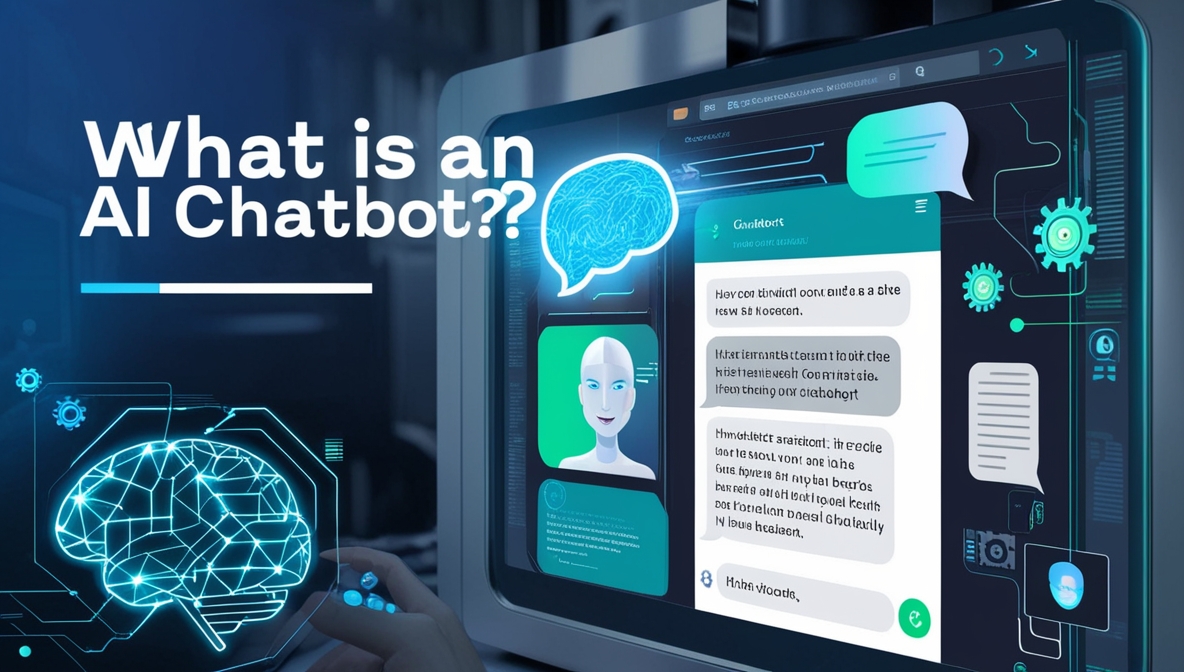An AI chatbot is a computer program that uses artificial intelligence to talk to people in a way that feels natural. It can answer questions, help with tasks, or chat for fun.
These chatbots use machine learning and data to improve over time and give better responses. They can be found on websites, apps, and messaging platforms.
In this article, we are going to discuss what is AI chatbot. We will look at how it works, where it is used, and why it has become so popular in today’s digital world.
How AI Chatbots Work?
- Natural Language Processing (NLP): AI chatbots use NLP to understand and process human language. This allows them to interpret and respond to text or voice in a way that feels natural.
- Machine Learning: These chatbots learn from previous interactions. The more they chat, the smarter they get, helping them handle complex questions and provide better responses.
- Data Integration: AI chatbots can integrate with business databases to provide real-time answers to queries related to product availability, order status, or user accounts.
Benefits of AI Chatbots
- 24/7 Availability: AI chatbots never need to sleep, providing round-the-clock support for businesses and customers alike.
- Quick Responses: 68% of consumers appreciate the speed of chatbot responses
- Cost Efficiency: Chatbots can reduce customer service costs by up to 30% by handling repetitive queries
- Enhanced User Experience: AI chatbots can improve user satisfaction with an average satisfaction rate of 87.58% for bot-only interactions
AI Chatbots in 2024- Key Statistics
- Growth in Chatbot Usage: By 2024, it is expected that 75% of user queries will be resolved by chatbots
- Customer Engagement: 41.3% of consumers use chatbots for making purchases, up from 17.1% in 2019
- E-commerce Impact: AI-powered chatbots are projected to generate $112 billion in transactions for the e-commerce sector by the end of 2023
- Business Adoption: 55% of businesses using chatbots report generating more high-quality leads
Types of AI Chatbots
- Rule-Based Chatbots: These are designed to follow specific rules and respond to predefined commands or keywords.
- Intelligent Chatbots: Powered by AI and machine learning, these chatbots can handle more complex tasks and adapt to conversations.
Where Are AI Chatbots Used?
- Customer Service: Automating responses to frequently asked questions, resolving issues, or offering product support.
- E-commerce: Assisting with product recommendations, checking out, or tracking orders.
- Healthcare: Providing medical information, scheduling appointments, or guiding patients through health inquiries.
- Education: Offering tutoring, answering academic queries, or providing administrative assistance.
FAQs
What is an AI chatbot?
An AI chatbot is a software application that uses artificial intelligence to simulate human-like conversations.
How does an AI chatbot learn to respond?
AI chatbots learn from large datasets and are trained with machine learning algorithms to generate appropriate responses.
What is the main use of an AI chatbot?
AI chatbots are primarily used for automating customer service, providing quick and efficient support.
Can an AI chatbot improve over time?
Yes, an AI chatbot can improve through continuous learning from interactions and user feedback.
Conclusion
AI chatbots are transforming how we interact with technology by offering efficient, real-time assistance across various platforms. Their ability to learn and improve over time allows them to provide smarter and more personalized responses, making them a valuable tool for businesses and individuals alike.
With widespread applications in customer service, e-commerce, healthcare, and education, AI chatbots are not only saving time but also enhancing the overall user experience. As they continue to evolve, their role in streamlining communication will only grow stronger.
P.S.: If you’re interested, try ON4T’s Unlimited Free Chat GPT 4 no login needed for a seamless experience!
